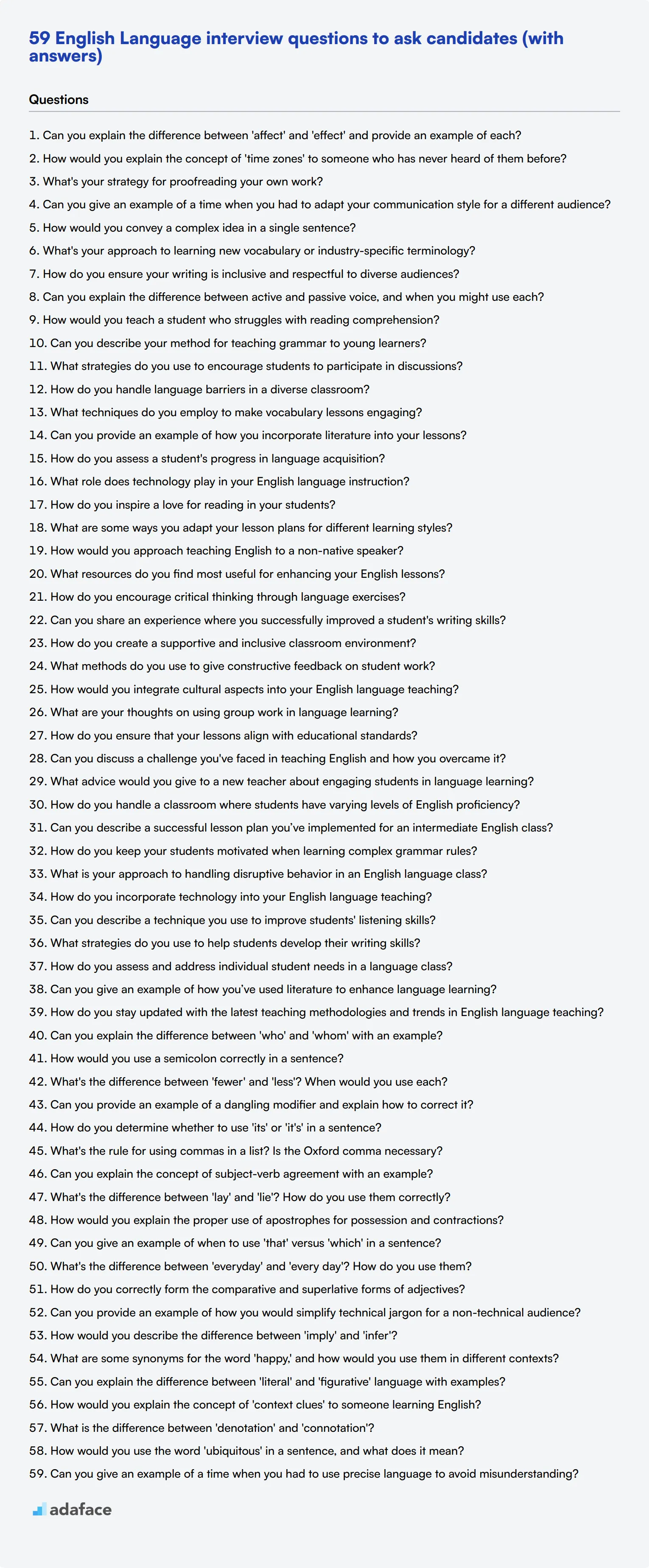Assessing a candidate's English language proficiency is crucial for hiring managers and recruiters in today's global workplace. Effective communication skills are the backbone of successful teams, and finding the right talent with strong English language abilities can significantly impact your organization's performance.
This blog post provides a comprehensive list of English Language interview questions tailored for different proficiency levels and teaching roles. We've organized the questions into sections covering general language skills, junior and intermediate teacher assessments, grammar rules, and vocabulary usage.
By using these interview questions, you can gain valuable insights into a candidate's English language capabilities and make informed hiring decisions. Consider combining these interview questions with pre-employment English language tests for a more thorough evaluation of candidates' skills.
Table of contents
8 general English Language interview questions and answers to assess candidates
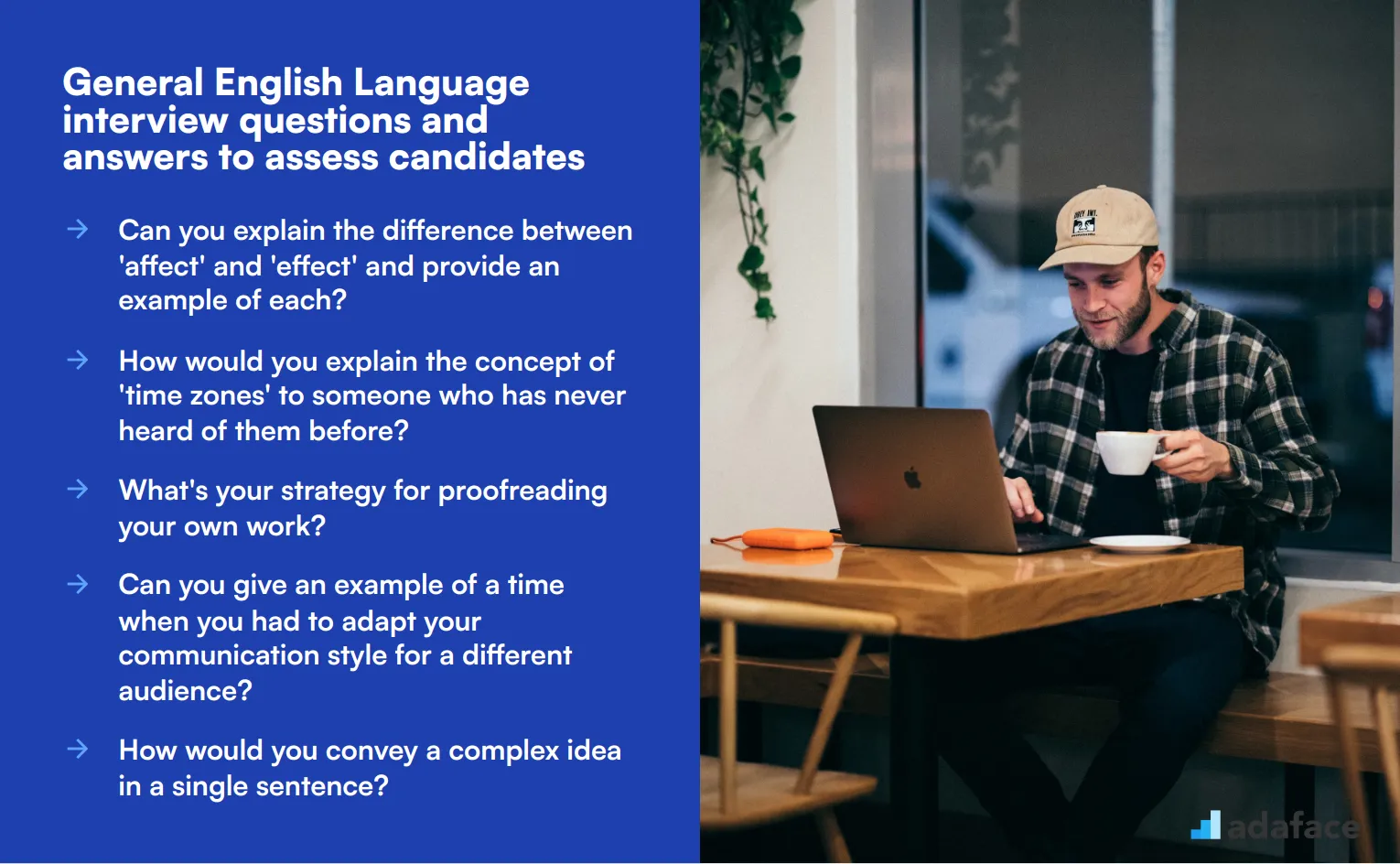
Ready to assess your candidates' English language prowess? These eight general English Language interview questions are your secret sauce for spotting linguistic superstars. Whether you're hiring for a content writer or a customer service rep, these questions will help you gauge communication skills, vocabulary, and language proficiency. Let's dive in!
1. Can you explain the difference between 'affect' and 'effect' and provide an example of each?
This question tests the candidate's understanding of commonly confused words. A strong answer should include:
- 'Affect' is typically used as a verb meaning to influence or make a difference to something.
- 'Effect' is usually a noun meaning the result or consequence of an action.
- Examples: 'The rain affected our plans for a picnic.' (verb) 'The effect of the medication was immediate.' (noun)
Look for clarity in explanation and appropriate usage in examples. A candidate who can articulate the difference confidently demonstrates a good grasp of English grammar and vocabulary.
2. How would you explain the concept of 'time zones' to someone who has never heard of them before?
This question assesses the candidate's ability to explain complex concepts in simple terms. A good answer might include:
- The Earth rotates, causing different parts of the world to face the sun at different times.
- To standardize time, the world is divided into 24 time zones.
- When it's noon in one zone, it might be 1 PM or 11 AM in adjacent zones.
- This system helps coordinate global activities and communication.
Pay attention to the candidate's use of clear, concise language and their ability to break down the concept into digestible parts. This skill is crucial for effective technical writing and communication in various roles.
3. What's your strategy for proofreading your own work?
This question reveals the candidate's attention to detail and self-editing skills. A comprehensive answer might include:
- Taking a break before proofreading to approach the text with fresh eyes
- Reading the text aloud to catch awkward phrasing or missed words
- Using digital tools like spell-checkers or grammar-checking software
- Focusing on one type of error at a time (e.g., punctuation, then spelling)
- Having a colleague review the work for a second opinion
Look for candidates who have a systematic approach to proofreading. This indicates a commitment to quality and an understanding of the importance of error-free communication.
4. Can you give an example of a time when you had to adapt your communication style for a different audience?
This question assesses the candidate's versatility in communication. A strong answer should:
- Describe a specific situation (e.g., explaining a technical concept to non-technical stakeholders)
- Explain the changes made to their communication style (e.g., using analogies, simplifying jargon)
- Highlight the positive outcome of this adaptation
Listen for candidates who demonstrate awareness of audience needs and the ability to flex their communication style accordingly. This skill is particularly valuable in roles that require interaction with diverse groups or content strategy.
5. How would you convey a complex idea in a single sentence?
This question tests the candidate's ability to be concise and clear. A good response should:
- Acknowledge the challenge of condensing complex ideas
- Suggest strategies like focusing on the core concept
- Mention the importance of choosing precise vocabulary
- Possibly provide an example of a complex idea simplified
Look for candidates who can demonstrate this skill on the spot. The ability to distill complex information into digestible chunks is crucial for many roles, especially in content creation and communication.
6. What's your approach to learning new vocabulary or industry-specific terminology?
This question reveals the candidate's commitment to ongoing language development. A comprehensive answer might include:
- Reading widely within the industry or field
- Using vocabulary apps or flashcards for regular practice
- Engaging in conversations with experts or colleagues
- Keeping a personal glossary of new terms
- Applying new words in writing or conversation to reinforce learning
Ideal candidates should show enthusiasm for expanding their vocabulary and a proactive approach to learning. This trait is particularly valuable in fast-evolving industries where terminology frequently changes.
7. How do you ensure your writing is inclusive and respectful to diverse audiences?
This question assesses the candidate's awareness of inclusive language. A strong answer might include:
- Using gender-neutral language when appropriate
- Avoiding cultural assumptions or stereotypes
- Being mindful of potentially offensive or outdated terms
- Seeking feedback from diverse readers or sensitivity readers
- Staying updated on evolving language norms and preferences
Look for candidates who demonstrate thoughtfulness about language's impact and a commitment to respectful communication. This awareness is crucial in today's diverse workplaces and global markets.
8. Can you explain the difference between active and passive voice, and when you might use each?
This question tests grammatical knowledge and writing style awareness. A good answer should include:
- Active voice: the subject performs the action (e.g., 'The cat chased the mouse.')
- Passive voice: the subject receives the action (e.g., 'The mouse was chased by the cat.')
- Active voice is generally preferred for clarity and directness
- Passive voice might be used to emphasize the receiver of an action or when the doer is unknown or unimportant
Look for candidates who can not only define the terms but also understand their appropriate usage. This knowledge is particularly important for roles involving content creation or editing.
21 English Language interview questions to ask junior teachers
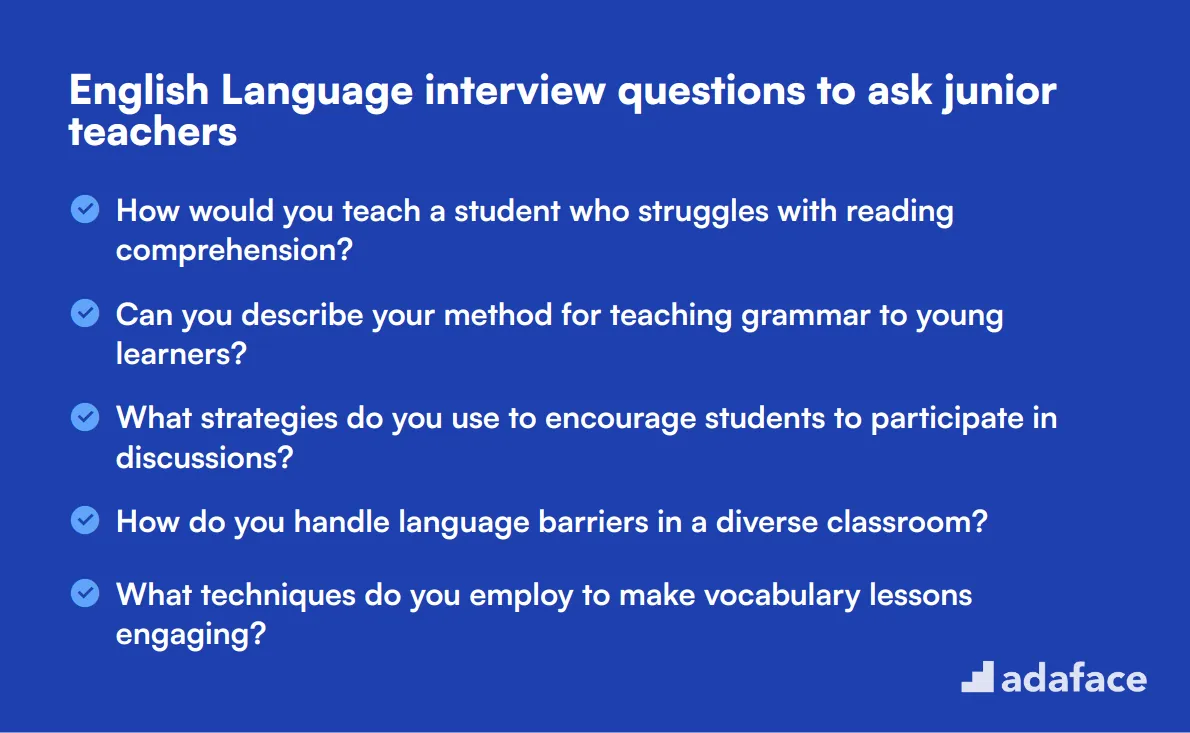
To effectively evaluate junior teachers' understanding of the English language, use this list of focused questions during interviews. These questions will help you gauge their communication skills and teaching methods, ensuring you find the right fit for your educational team. The goal is to uncover their practical knowledge and how they can engage students. For more insights, check our content writer job description for additional context.
- How would you teach a student who struggles with reading comprehension?
- Can you describe your method for teaching grammar to young learners?
- What strategies do you use to encourage students to participate in discussions?
- How do you handle language barriers in a diverse classroom?
- What techniques do you employ to make vocabulary lessons engaging?
- Can you provide an example of how you incorporate literature into your lessons?
- How do you assess a student's progress in language acquisition?
- What role does technology play in your English language instruction?
- How do you inspire a love for reading in your students?
- What are some ways you adapt your lesson plans for different learning styles?
- How would you approach teaching English to a non-native speaker?
- What resources do you find most useful for enhancing your English lessons?
- How do you encourage critical thinking through language exercises?
- Can you share an experience where you successfully improved a student's writing skills?
- How do you create a supportive and inclusive classroom environment?
- What methods do you use to give constructive feedback on student work?
- How would you integrate cultural aspects into your English language teaching?
- What are your thoughts on using group work in language learning?
- How do you ensure that your lessons align with educational standards?
- Can you discuss a challenge you've faced in teaching English and how you overcame it?
- What advice would you give to a new teacher about engaging students in language learning?
10 intermediate English Language interview questions and answers to ask mid-tier teachers.
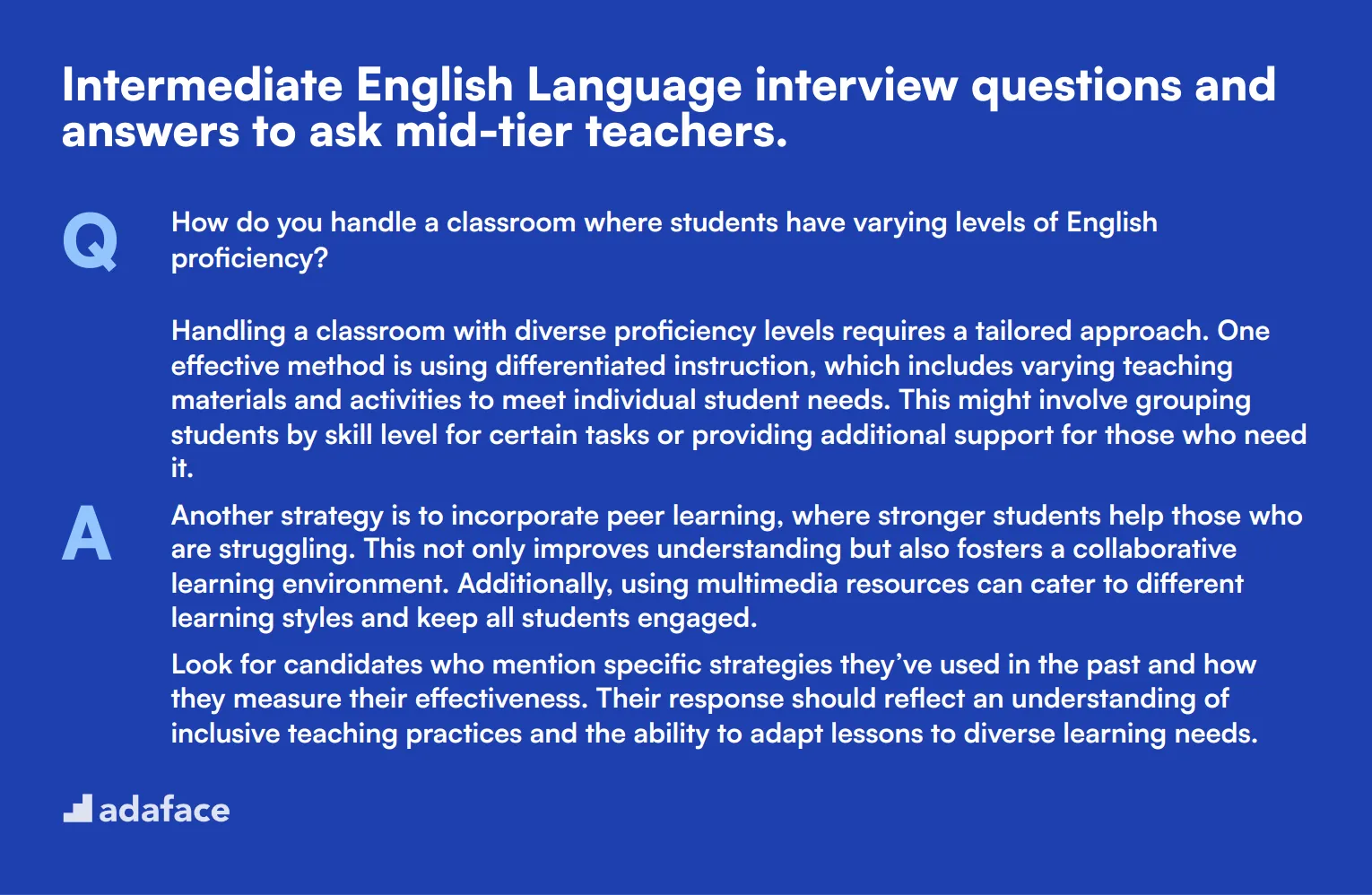
For hiring managers looking to assess the skills and knowledge of mid-tier English language teachers, this curated list of intermediate interview questions is a valuable resource. These questions are designed to delve deeper into the candidates' teaching methodologies and their ability to handle classroom challenges.
1. How do you handle a classroom where students have varying levels of English proficiency?
Handling a classroom with diverse proficiency levels requires a tailored approach. One effective method is using differentiated instruction, which includes varying teaching materials and activities to meet individual student needs. This might involve grouping students by skill level for certain tasks or providing additional support for those who need it.
Another strategy is to incorporate peer learning, where stronger students help those who are struggling. This not only improves understanding but also fosters a collaborative learning environment. Additionally, using multimedia resources can cater to different learning styles and keep all students engaged.
Look for candidates who mention specific strategies they’ve used in the past and how they measure their effectiveness. Their response should reflect an understanding of inclusive teaching practices and the ability to adapt lessons to diverse learning needs.
2. Can you describe a successful lesson plan you’ve implemented for an intermediate English class?
A successful lesson plan for an intermediate English class should include clear objectives, engaging activities, and a variety of assessments. For example, a lesson on persuasive writing might start with a discussion on famous speeches, followed by analyzing excerpts, and then having students write their own persuasive pieces.
Incorporating interactive elements like debates or group discussions can enhance student engagement and provide practical experience. It's also important to include formative assessments to gauge understanding and adjust the lesson accordingly.
Ideal candidates will provide a detailed example, explaining the rationale behind each component of their lesson plan. They should demonstrate an ability to create engaging, educationally sound lessons that cater to intermediate learners.
3. How do you keep your students motivated when learning complex grammar rules?
Keeping students motivated when learning complex grammar rules can be challenging, but it's achievable with the right approach. One effective method is to make grammar lessons interactive and fun by using games, quizzes, and real-life examples. This not only makes learning more enjoyable but also helps students see the practical application of grammar.
Another approach is to provide regular, positive feedback and celebrate small victories, which can boost confidence and motivation. Additionally, integrating grammar lessons into broader language activities, like writing or speaking exercises, can help students understand the relevance of what they’re learning.
A strong candidate will mention multiple strategies and provide examples of how they’ve successfully kept students engaged in the past. Look for enthusiasm and creativity in their approach to teaching grammar.
4. What is your approach to handling disruptive behavior in an English language class?
Handling disruptive behavior in the classroom requires a calm and consistent approach. One effective strategy is to establish clear rules and expectations from the beginning. This includes setting consequences for disruptive behavior and consistently enforcing them.
It's also important to understand the root cause of the behavior. Sometimes, addressing underlying issues like boredom, frustration, or personal problems can help mitigate disruptions. Techniques such as positive reinforcement, engaging lesson plans, and building a rapport with students can also be effective.
Candidates should demonstrate an understanding of classroom management techniques and an ability to maintain a positive learning environment. Their response should reflect a balanced approach between discipline and understanding.
5. How do you incorporate technology into your English language teaching?
Incorporating technology into English language teaching can enhance learning and engagement. Some effective tools include interactive whiteboards, language learning apps, and online resources like videos and articles. These tools can make lessons more dynamic and cater to different learning styles.
Using technology for collaborative projects, such as creating digital presentations or participating in online forums, can also help students develop their language skills in real-world contexts. Additionally, technology can be used for formative assessments, providing immediate feedback and tracking student progress.
Look for candidates who can provide specific examples of how they've successfully integrated technology into their lessons. Their response should demonstrate an understanding of how technology can be used to enhance learning and engagement.
6. Can you describe a technique you use to improve students' listening skills?
Improving students' listening skills involves a variety of techniques. One effective method is to use authentic audio materials, such as podcasts, songs, or news broadcasts. These materials expose students to different accents, speech patterns, and vocabulary in real-world contexts.
Another technique is to incorporate listening activities into lessons, like dictations, fill-in-the-blank exercises, or comprehension questions. Encouraging students to practice active listening, by taking notes or summarizing what they’ve heard, can also be beneficial.
The ideal candidate will mention multiple techniques and provide examples of how they’ve successfully improved students' listening skills. Their response should reflect an understanding of the importance of listening in language acquisition.
7. What strategies do you use to help students develop their writing skills?
Developing students' writing skills requires a structured approach. One effective strategy is to use writing prompts and exercises that encourage students to practice different types of writing, such as narratives, essays, and reports. Providing clear guidelines and examples can help students understand the expectations.
Another strategy is to implement peer review sessions, where students give and receive feedback on their writing. This not only improves their writing skills but also fosters a collaborative learning environment. Additionally, providing regular, constructive feedback and opportunities for revision can help students improve over time.
Candidates should mention multiple strategies and provide examples of how they’ve successfully helped students develop their writing skills. Look for an understanding of different writing styles and the ability to provide constructive feedback.
8. How do you assess and address individual student needs in a language class?
Assessing and addressing individual student needs involves regular formative assessments, such as quizzes, observations, and one-on-one conferences. These assessments help identify areas where students may be struggling and allow for targeted interventions.
Differentiated instruction is another key strategy, where lessons are tailored to meet the diverse needs of students. This might involve providing additional support materials, modifying assignments, or offering extra help sessions. Building a rapport with students and understanding their learning preferences can also inform instructional decisions.
Look for candidates who demonstrate a proactive approach to assessing and addressing student needs. Their response should reflect an understanding of diverse learning styles and the ability to adapt their teaching methods accordingly.
9. Can you give an example of how you’ve used literature to enhance language learning?
Using literature to enhance language learning can be highly effective. For example, incorporating a novel or short story into lessons can provide rich material for vocabulary building, discussion, and analysis. Activities might include reading comprehension questions, character analysis, and creative writing assignments based on the text.
Literature can also be used to introduce cultural contexts and themes, making language learning more engaging and meaningful. Encouraging students to express their opinions and interpretations of the text can further enhance critical thinking and communication skills.
The ideal candidate will provide a specific example of how they’ve successfully used literature in their teaching. Their response should demonstrate an ability to make literature accessible and engaging for students.
10. How do you stay updated with the latest teaching methodologies and trends in English language teaching?
Staying updated with the latest teaching methodologies and trends is crucial for effective language teaching. One way to do this is by attending professional development workshops, conferences, and webinars. These events provide opportunities to learn from experts and network with other educators.
Another approach is to regularly read professional journals, books, and online resources related to language teaching. Participating in online forums and social media groups for educators can also provide valuable insights and ideas. Additionally, collaborating with colleagues and sharing best practices can help stay informed about new strategies and tools.
Look for candidates who demonstrate a commitment to continuous learning and professional growth. Their response should reflect a proactive approach to staying current with developments in the field of English language teaching.
12 English Language interview questions about grammar rules
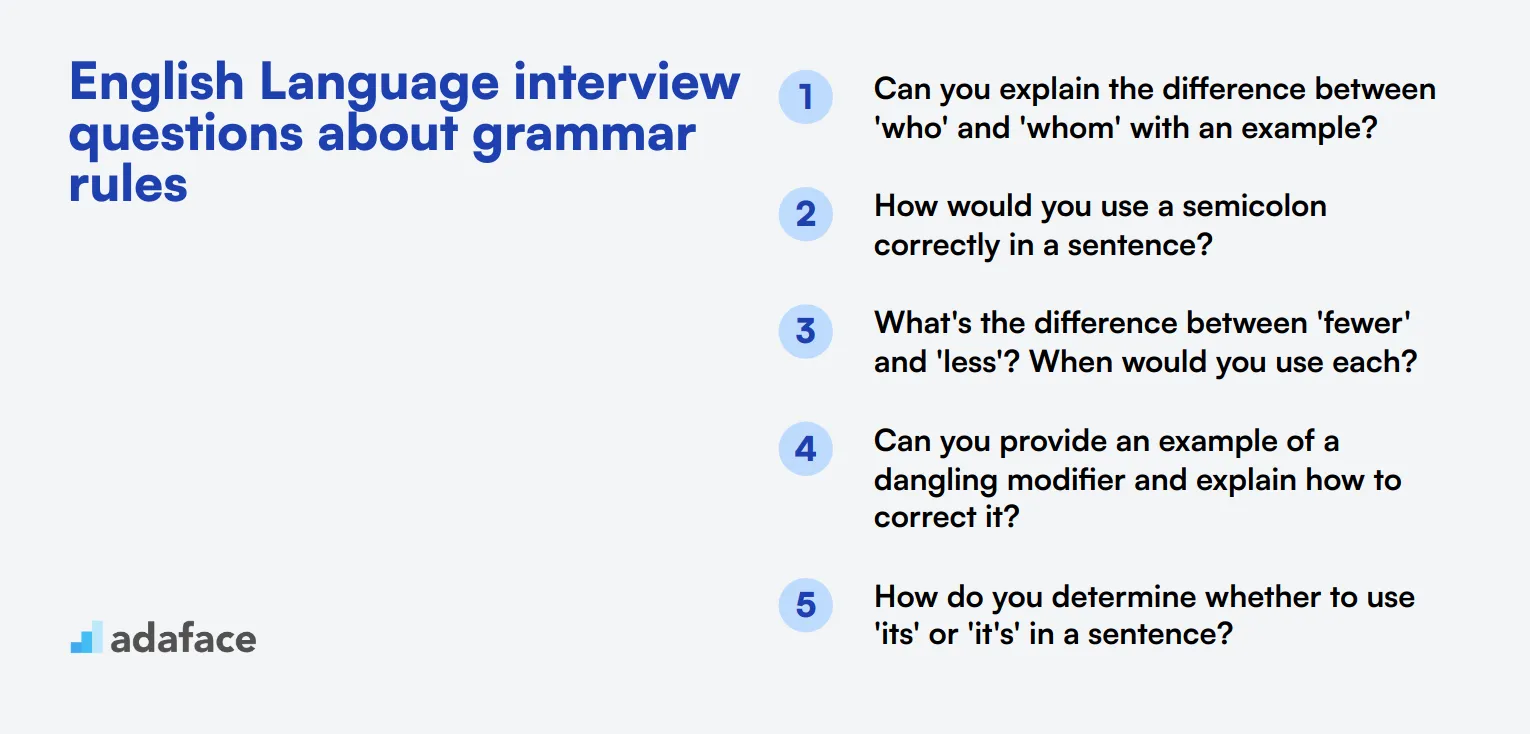
To assess candidates' grasp of essential grammar rules, use these 12 English Language interview questions. These questions help evaluate an applicant's language proficiency and their ability to apply grammatical concepts in practical scenarios.
- Can you explain the difference between 'who' and 'whom' with an example?
- How would you use a semicolon correctly in a sentence?
- What's the difference between 'fewer' and 'less'? When would you use each?
- Can you provide an example of a dangling modifier and explain how to correct it?
- How do you determine whether to use 'its' or 'it's' in a sentence?
- What's the rule for using commas in a list? Is the Oxford comma necessary?
- Can you explain the concept of subject-verb agreement with an example?
- What's the difference between 'lay' and 'lie'? How do you use them correctly?
- How would you explain the proper use of apostrophes for possession and contractions?
- Can you give an example of when to use 'that' versus 'which' in a sentence?
- What's the difference between 'everyday' and 'every day'? How do you use them?
- How do you correctly form the comparative and superlative forms of adjectives?
8 English Language interview questions and answers related to vocabulary usage
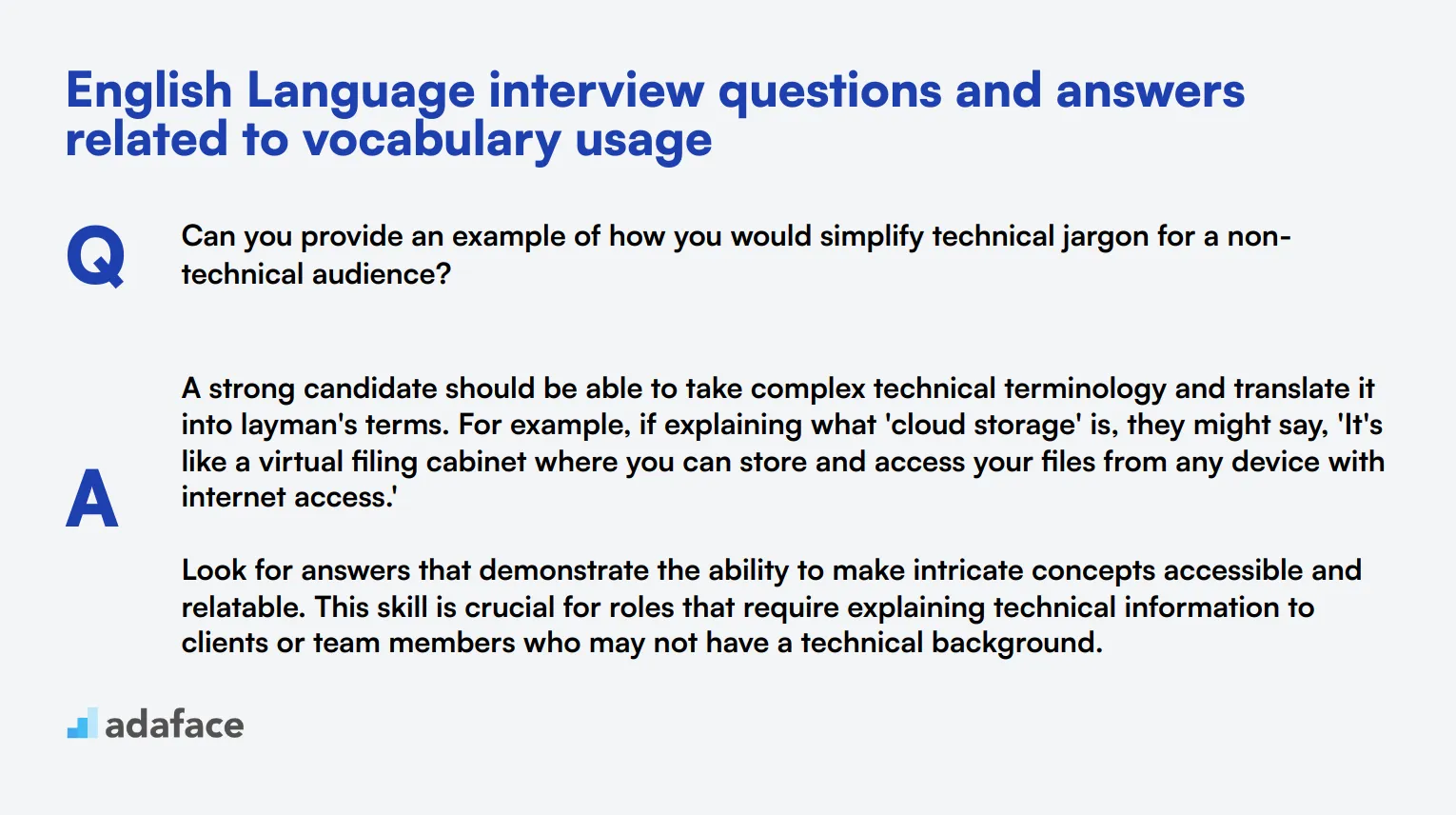
When interviewing candidates for positions that require strong English language skills, it's essential to assess their vocabulary usage. This list of questions will help you gauge their proficiency and ensure they're a good fit for roles that demand precise and effective communication.
1. Can you provide an example of how you would simplify technical jargon for a non-technical audience?
A strong candidate should be able to take complex technical terminology and translate it into layman's terms. For example, if explaining what 'cloud storage' is, they might say, 'It's like a virtual filing cabinet where you can store and access your files from any device with internet access.'
Look for answers that demonstrate the ability to make intricate concepts accessible and relatable. This skill is crucial for roles that require explaining technical information to clients or team members who may not have a technical background.
2. How would you describe the difference between 'imply' and 'infer'?
'Imply' means to suggest or hint at something without explicitly stating it. For example, 'Her tone implied that she was unhappy with the decision.' On the other hand, 'infer' means to deduce or conclude information from evidence and reasoning. For instance, 'From his tone, I inferred that he was unhappy with the decision.'
Ideal candidates should clearly distinguish between the two terms and use them correctly in context. Their ability to articulate the difference indicates a solid understanding of nuanced vocabulary usage.
3. What are some synonyms for the word 'happy,' and how would you use them in different contexts?
Some synonyms for 'happy' include 'joyful,' 'content,' 'pleased,' and 'elated.' Each word can be used in slightly different contexts. For example, 'joyful' might describe a celebratory mood, as in 'She was joyful at her wedding.' 'Content' might describe a peaceful satisfaction, as in 'He felt content after a productive day.'
Candidates should demonstrate not only a range of vocabulary but also an understanding of the subtle differences in meaning and context. This skill is important for roles that require nuanced and precise communication.
4. Can you explain the difference between 'literal' and 'figurative' language with examples?
'Literal' language means exactly what it says, without embellishment or figurative interpretation. For example, 'The sky is blue.' 'Figurative' language uses metaphors, similes, and other devices to convey meanings beyond the literal. For example, 'The world is your oyster,' which means you have endless opportunities.
An ideal candidate should be able to provide clear examples and explain the purpose of using figurative language in various contexts, such as in creative writing or persuasive communication.
5. How would you explain the concept of 'context clues' to someone learning English?
'Context clues' are hints found within a sentence or paragraph that help the reader understand the meaning of an unfamiliar word. For example, in the sentence 'The arboreal creature, such as a monkey, thrives in the forest,' the phrase 'such as a monkey' helps the reader infer that 'arboreal' relates to living in trees.
Candidates should demonstrate the ability to teach this concept effectively, as it's a critical skill for understanding and learning new vocabulary. Look for clear explanations and practical examples.
6. What is the difference between 'denotation' and 'connotation'?
'Denotation' is the literal dictionary definition of a word. For example, the denotation of 'snake' is a legless reptile. 'Connotation' refers to the emotional or cultural associations attached to a word. For instance, the connotation of 'snake' might include deceit or danger.
Strong answers will show an understanding of how words can carry different meanings beyond their strict definitions. This understanding is crucial for effective communication, especially in nuanced or sensitive contexts.
7. How would you use the word 'ubiquitous' in a sentence, and what does it mean?
The word 'ubiquitous' means something that is present, appearing, or found everywhere. For example, 'Smartphones have become ubiquitous in modern society.'
Candidates should not only provide a correct definition but also use the word accurately in context. This indicates a robust vocabulary and the ability to apply complex words appropriately.
8. Can you give an example of a time when you had to use precise language to avoid misunderstanding?
In a professional setting, precise language can prevent misunderstandings and errors. For example, 'When I was coordinating a project, I made sure to clearly specify deadlines and responsibilities in my emails to avoid any confusion among team members.'
Look for candidates who can provide specific examples and demonstrate the importance of clarity in communication. Their response should highlight their attention to detail and ability to convey information accurately.
Which English Language skills should you evaluate during the interview phase?
While it's impossible to assess every aspect of a candidate's English language skills in one interview, focusing on core skills can provide valuable insights into their proficiency. Here are the essential English language skills to evaluate during the interview phase.
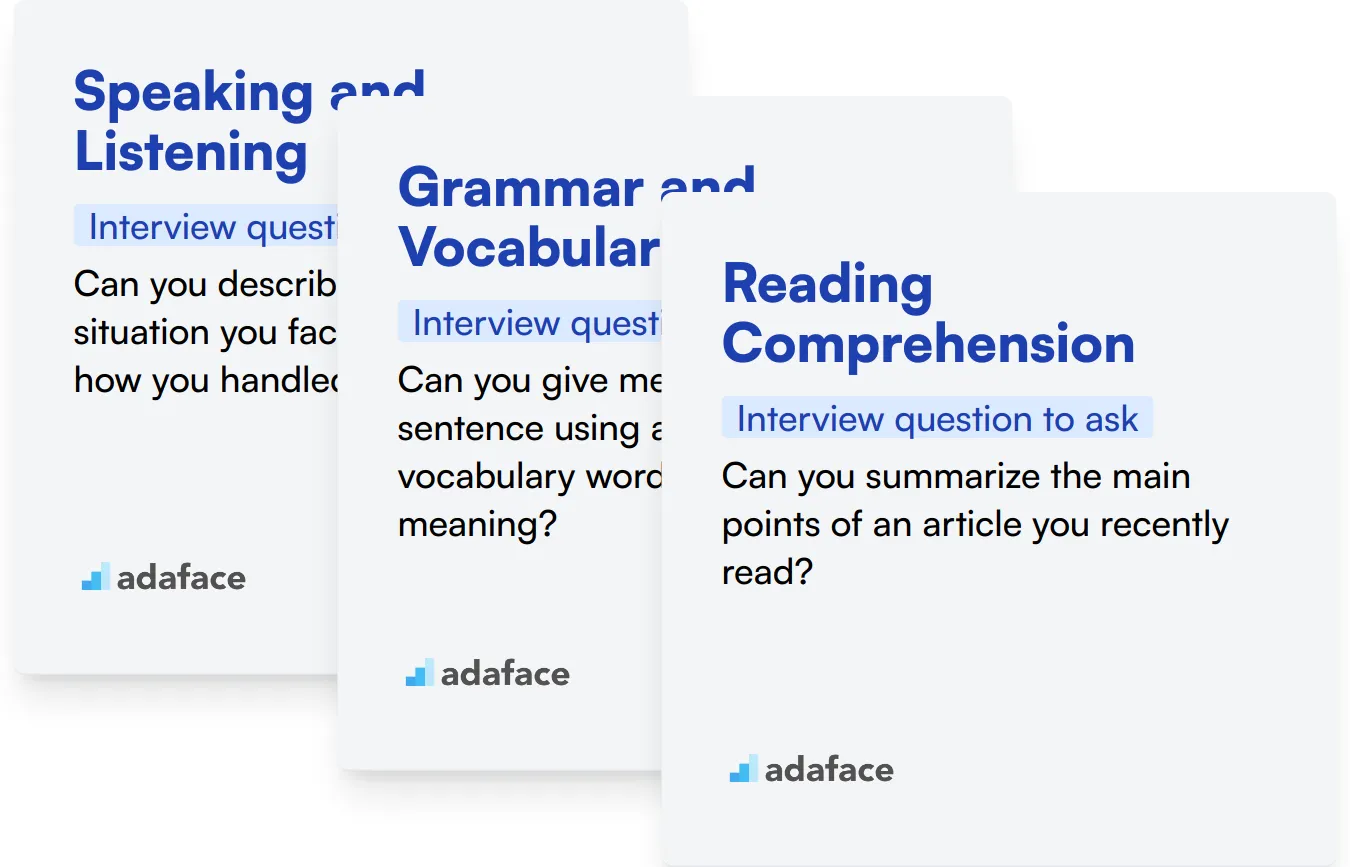
Speaking and Listening
Effective communication is often the cornerstone of many roles, making speaking and listening crucial in assessing a candidate's English language proficiency. These skills allow candidates to express ideas clearly and understand others accurately.
You can use an assessment test that includes relevant MCQs to gauge speaking and listening skills. This way, you can filter out candidates who demonstrate strong comprehension and articulation abilities. Check out our test.
In addition to tests, you can ask targeted interview questions to judge these subskills. Here’s an example:
Can you describe a challenging situation you faced at work and how you handled it?
When asking this question, look for clarity in the candidate's response and their ability to convey the situation effectively. Pay attention to their vocabulary choice, sentence structure, and how well they articulate their thoughts.
Grammar and Vocabulary
A solid grasp of grammar and vocabulary is essential for accuracy in both written and spoken English. These skills determine a candidate's ability to communicate without errors that could lead to misunderstandings.
Consider using an assessment test that includes questions on grammar and vocabulary. This will help identify candidates with strong foundational knowledge. Explore our grammar and vocabulary test.
To evaluate grammar and vocabulary during an interview, ask specific questions that test these aspects. Here’s a question to consider:
Can you give me an example of a sentence using a complex vocabulary word and explain its meaning?
When the candidate responds, listen for correct usage of the complex word within the sentence. Also, ensure they can explain the meaning clearly, demonstrating a deep understanding of vocabulary.
Reading Comprehension
Reading comprehension is important for understanding and interpreting written content, which is critical in many job roles. It ensures that candidates can accurately grasp written instructions and textual information.
Employ an assessment test featuring MCQs to measure reading comprehension skills. This can effectively filter out candidates who demonstrate strong interpretative abilities. Try our reading comprehension test.
During the interview, you can ask questions that directly assess reading comprehension. For example:
Can you summarize the main points of an article you recently read?
Look for the candidate's ability to concisely summarize important information, indicating their understanding and retention of the material. Pay attention to how well they capture key points and present them clearly.
3 Essential Tips for Using English Language Interview Questions
Before you start putting your knowledge into practice, here are a few tips to enhance your interviewing process. These insights will help you leverage the power of English language interview questions effectively.
1. Incorporate Skill Tests to Screen Candidates
Using skill tests before interviews can significantly improve your candidate selection. These tests provide measurable data on a candidate's proficiency in English, allowing you to assess their communication abilities accurately.
For assessing English language skills, consider tests like the English Comprehension Test or the English Proficient C1 Test. Implementing these tests helps filter candidates to those who meet your language requirements.
The results from these tests can guide your interview questions, ensuring you focus on evaluating relevant skills in your conversation. This method not only streamlines the interview process but also sets the stage for a more effective evaluation of candidates.
2. Select Targeted Questions for Interviews
Time is limited during interviews, making it essential to choose the right questions. Focus on a few key areas that reveal a candidate's language skills to maximize your assessment effectiveness.
In addition to language questions, consider asking about related skills such as communication abilities or cultural fit. For example, you might explore soft skills through questions on teamwork or adaptability, which can be found in our communication assessment tools.
Crafting a concise set of questions ensures you cover important aspects without overwhelming yourself or the candidate, increasing your chances of a successful evaluation.
3. Utilize Follow-Up Questions for Deeper Insights
Simply asking interview questions isn't enough; follow-up questions are vital for gaining deeper insights. Candidates may provide surface answers, so digging deeper helps you understand their true capabilities and experiences.
For instance, if a candidate states they have experience with English language instruction, a good follow-up could be, 'Can you describe a specific lesson plan you created?' This question encourages them to elaborate, revealing their depth of understanding and practical application.
Use English Language interview questions and skills tests to hire talented teachers
If you are looking to hire someone with strong English Language skills, you need to ensure they possess these skills accurately. The best way to do this is to use skill tests that evaluate their competencies. Consider using our English Comprehension Test or English Proficient C1 Test.
Once you use these tests, you can shortlist the best applicants and call them for interviews. For the next steps, you can sign up on our platform here or learn more about our online assessment platform.
English Comprehension Test
Download English Language interview questions template in multiple formats
English Language Interview Questions FAQs
Use a combination of general questions, skill-specific inquiries, and practical exercises to evaluate speaking, listening, reading, and writing abilities.
Focus on teaching methodologies, grammar knowledge, vocabulary usage, and the ability to explain complex language concepts clearly.
Adjust the complexity of questions based on the position level, using more basic queries for junior roles and more advanced ones for experienced teachers.
Yes, a brief teaching demonstration can provide valuable insights into a candidate's instructional skills and classroom presence.

40 min skill tests.
No trick questions.
Accurate shortlisting.
We make it easy for you to find the best candidates in your pipeline with a 40 min skills test.
Try for freeRelated posts
Free resources




